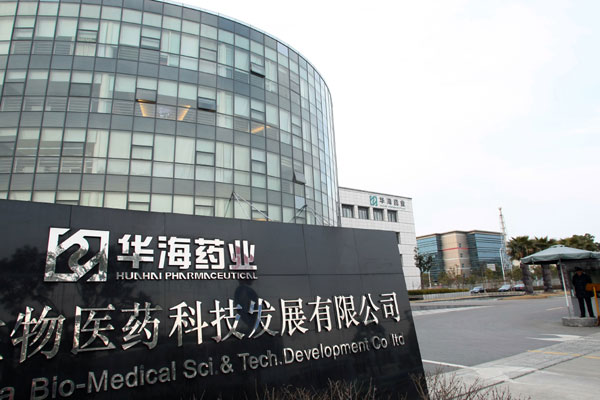Pharmaceutical industry needs shot of innovation
By Yao Jing (China Daily) Updated: 2014-02-11 07:17
|
 |
|
Zhejiang Huahai Pharmaceutical Co Ltd in Zhangjiang High-Tech Park in Shanghai. Provided to China Daily |
Despite an overall increase in China's pharmaceutical foreign trade, growth of its exports showed signs of slowing down in 2013, a chamber of commerce group reported.
Total foreign trade involving pharmaceuticals rose 10.27 percent to $89.69 billion last year, with exports up 6.84 percent and imports rising 15.17 percent compared with 2012, according to figures from the China Chamber of Commerce for Imports & Exports of Medicine & Health Products.
"China's pharmaceutical industry is entering a critical period of transformation as it is losing its traditional competitiveness, such as price, and is also faced with sluggish international market, especially in Europe and the United States," said Xu Ming, chamber vice-chairman.
The trade surplus totaled $12.67 billion in 2013, a year-on-year drop of 12 percent.
China's exports of active pharmaceutical ingredients still play a major role, as its export volume accounted for 46.27 percent of the industry's total exports.
But bulk active pharmaceutical ingredients have experienced a continuing decline since the fourth quarter of 2012.
In 2013's third quarter, the sector saw the steepest quarterly drop it had ever recorded, a drop of 9.52 percent.
The exports of high value-added pharmaceutical ingredients, such as drugs for cardiovascular diseases, have performed much better.
The export of traditional Chinese medicine products gained momentum with a year-on-year rise of 25.54 percent, to $3.14 billion. "The trend has been driven by an increasing demand from the international market for plant extracts and Chinese herbal medicine," Xu said.
Shipments of medical devices totaled $19.34 billion in 2013, an increase of 9.92 percent compared with 2012.
"The medical device sector is doing much better than drugs," Xu said, adding that China has become the biggest export country of small and medium-sized medical equipment.
Confronted with strict rules on drug quality and registration in the international market, along with slow economic recovery in traditional markets and the pressure of yuan appreciation, the medical industry is in need of a shakeup, Xu said.
When it comes to going global, the preparation sector may have stepped forward.
In 2013, exports of Western medicine preparations rose by 5.82 percent, while biochemical resistance grew 6.13 percent.
"Chinese producers should work more closely with foreign makers and get more international certifications," said Xu.
Last May, the US-based Oncobiologics Inc and Zhejiang Huahai Pharmaceutical Co Ltd agreed to jointly develop, manufacture and market biosimilar monoclonal antibody products.
Xu predicted that the industry's total foreign trade would edge up 10 percent this year thanks to Chinese companies' outward push and growing sales in medical devices.
- NHTSA says finds no 'defect trend' in Tesla Model S sedans
- WTO rare earth ruling is unfair
- Amway says 2014 China sales may grow 8%
- President Xi in Europe: Forging deals, boosting business
- CNOOC releases 2013 sustainability report
- Local production by Chery Jaguar Land Rover this year
- Car lovers test their need for speed in BMW Mission 3
- China stocks close mixed Monday

















